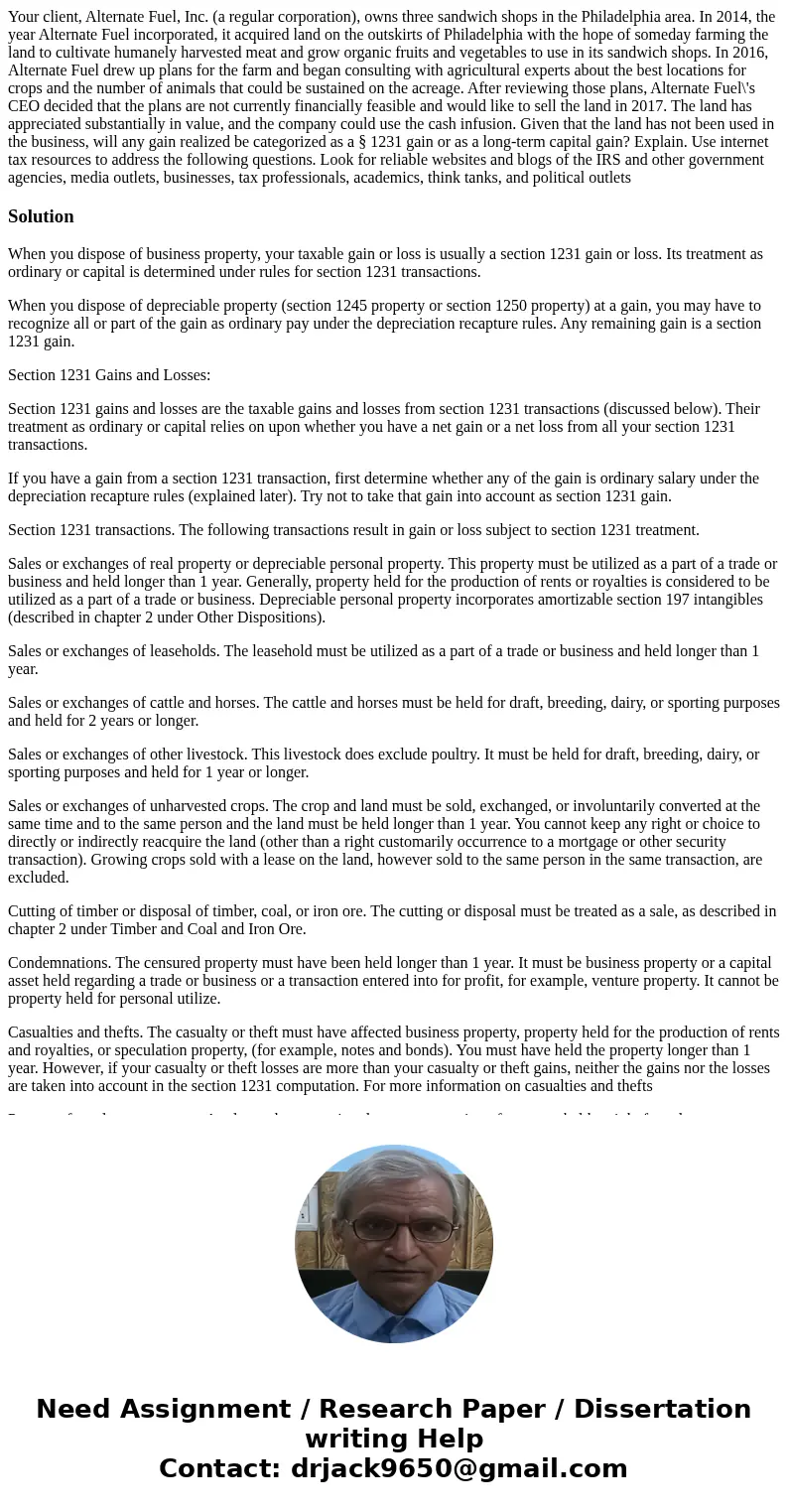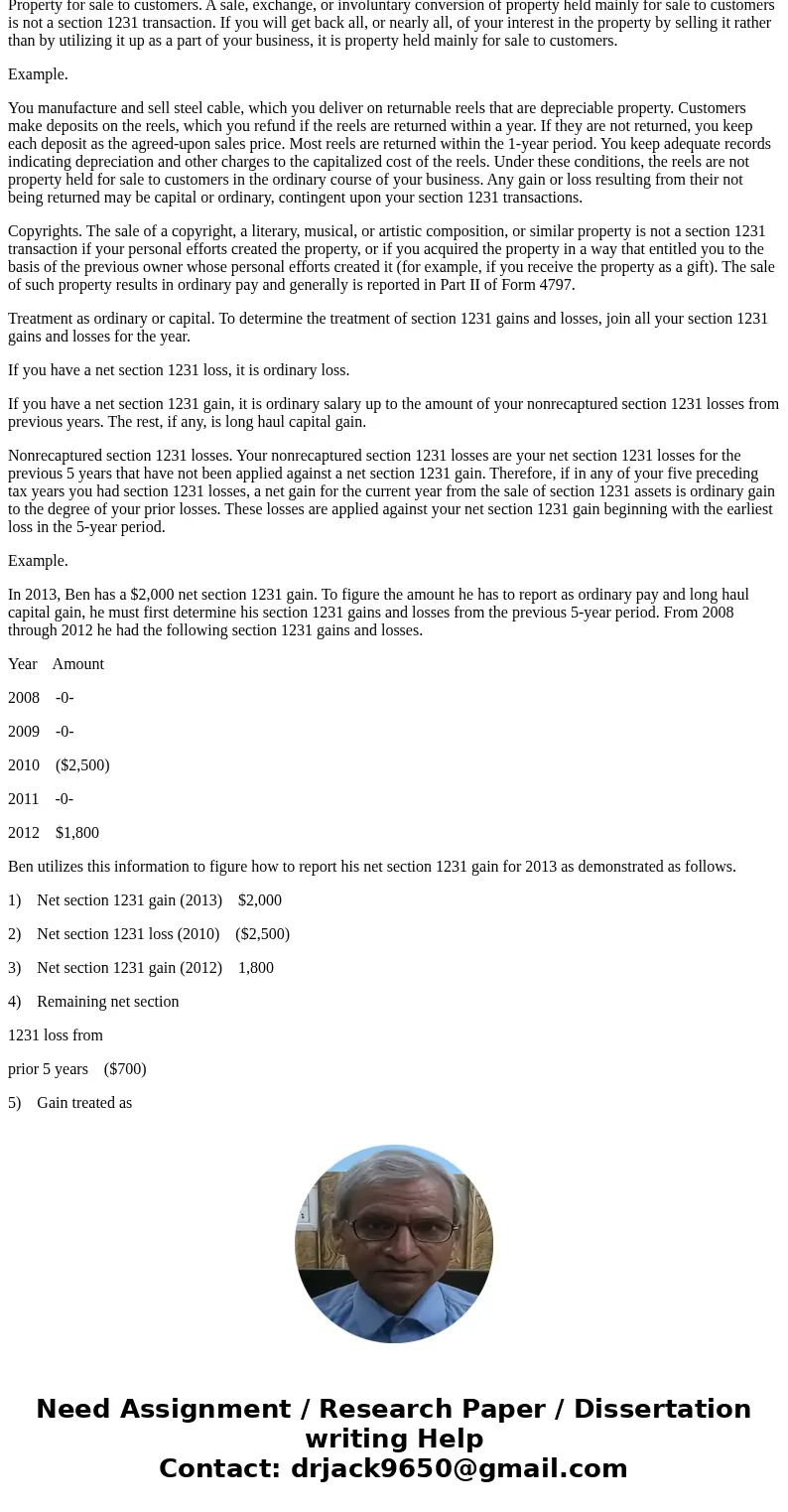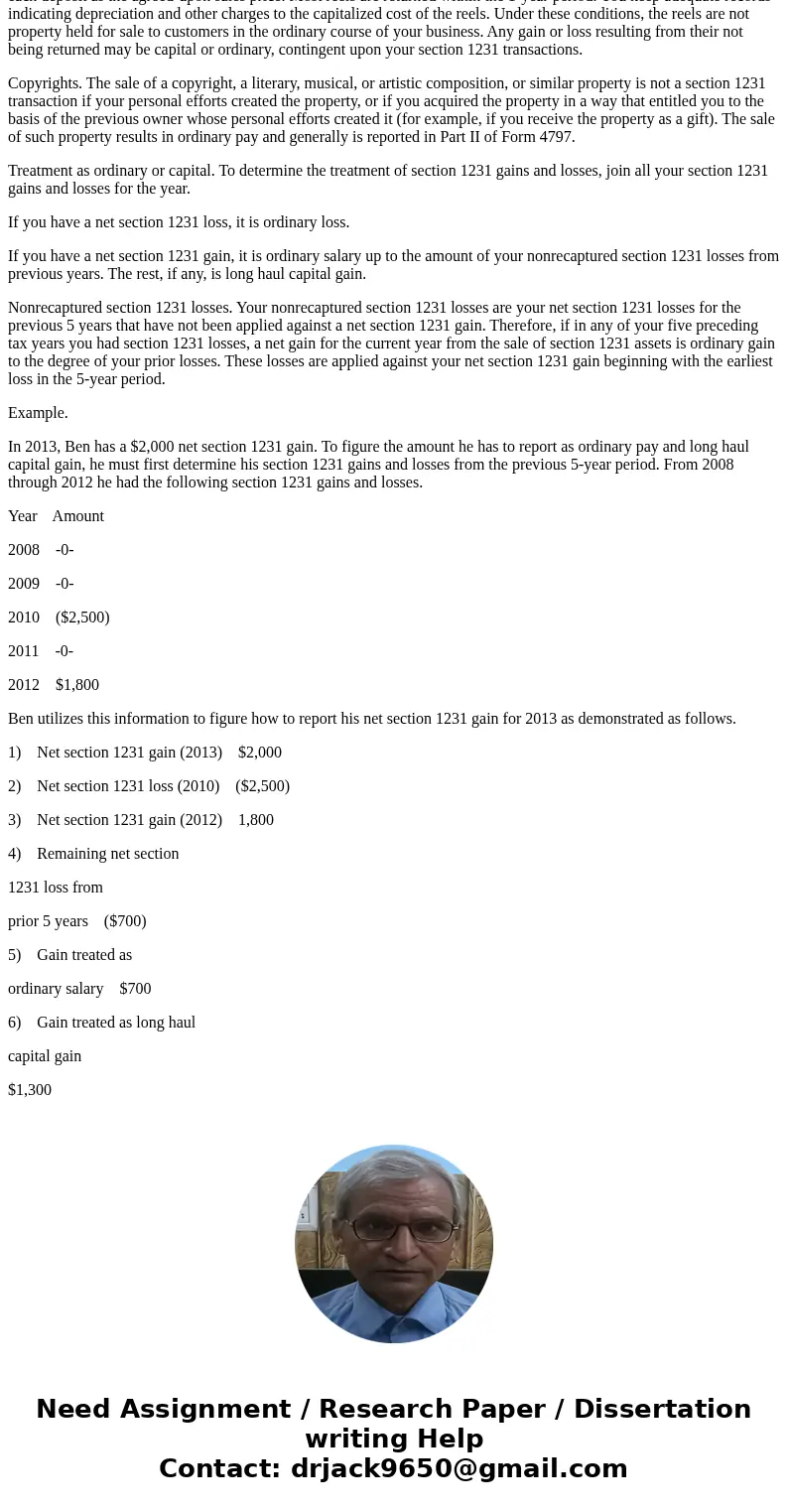Your client Alternate Fuel Inc a regular corporation owns th
Solution
When you dispose of business property, your taxable gain or loss is usually a section 1231 gain or loss. Its treatment as ordinary or capital is determined under rules for section 1231 transactions.
When you dispose of depreciable property (section 1245 property or section 1250 property) at a gain, you may have to recognize all or part of the gain as ordinary pay under the depreciation recapture rules. Any remaining gain is a section 1231 gain.
Section 1231 Gains and Losses:
Section 1231 gains and losses are the taxable gains and losses from section 1231 transactions (discussed below). Their treatment as ordinary or capital relies on upon whether you have a net gain or a net loss from all your section 1231 transactions.
If you have a gain from a section 1231 transaction, first determine whether any of the gain is ordinary salary under the depreciation recapture rules (explained later). Try not to take that gain into account as section 1231 gain.
Section 1231 transactions. The following transactions result in gain or loss subject to section 1231 treatment.
Sales or exchanges of real property or depreciable personal property. This property must be utilized as a part of a trade or business and held longer than 1 year. Generally, property held for the production of rents or royalties is considered to be utilized as a part of a trade or business. Depreciable personal property incorporates amortizable section 197 intangibles (described in chapter 2 under Other Dispositions).
Sales or exchanges of leaseholds. The leasehold must be utilized as a part of a trade or business and held longer than 1 year.
Sales or exchanges of cattle and horses. The cattle and horses must be held for draft, breeding, dairy, or sporting purposes and held for 2 years or longer.
Sales or exchanges of other livestock. This livestock does exclude poultry. It must be held for draft, breeding, dairy, or sporting purposes and held for 1 year or longer.
Sales or exchanges of unharvested crops. The crop and land must be sold, exchanged, or involuntarily converted at the same time and to the same person and the land must be held longer than 1 year. You cannot keep any right or choice to directly or indirectly reacquire the land (other than a right customarily occurrence to a mortgage or other security transaction). Growing crops sold with a lease on the land, however sold to the same person in the same transaction, are excluded.
Cutting of timber or disposal of timber, coal, or iron ore. The cutting or disposal must be treated as a sale, as described in chapter 2 under Timber and Coal and Iron Ore.
Condemnations. The censured property must have been held longer than 1 year. It must be business property or a capital asset held regarding a trade or business or a transaction entered into for profit, for example, venture property. It cannot be property held for personal utilize.
Casualties and thefts. The casualty or theft must have affected business property, property held for the production of rents and royalties, or speculation property, (for example, notes and bonds). You must have held the property longer than 1 year. However, if your casualty or theft losses are more than your casualty or theft gains, neither the gains nor the losses are taken into account in the section 1231 computation. For more information on casualties and thefts
Property for sale to customers. A sale, exchange, or involuntary conversion of property held mainly for sale to customers is not a section 1231 transaction. If you will get back all, or nearly all, of your interest in the property by selling it rather than by utilizing it up as a part of your business, it is property held mainly for sale to customers.
Example.
You manufacture and sell steel cable, which you deliver on returnable reels that are depreciable property. Customers make deposits on the reels, which you refund if the reels are returned within a year. If they are not returned, you keep each deposit as the agreed-upon sales price. Most reels are returned within the 1-year period. You keep adequate records indicating depreciation and other charges to the capitalized cost of the reels. Under these conditions, the reels are not property held for sale to customers in the ordinary course of your business. Any gain or loss resulting from their not being returned may be capital or ordinary, contingent upon your section 1231 transactions.
Copyrights. The sale of a copyright, a literary, musical, or artistic composition, or similar property is not a section 1231 transaction if your personal efforts created the property, or if you acquired the property in a way that entitled you to the basis of the previous owner whose personal efforts created it (for example, if you receive the property as a gift). The sale of such property results in ordinary pay and generally is reported in Part II of Form 4797.
Treatment as ordinary or capital. To determine the treatment of section 1231 gains and losses, join all your section 1231 gains and losses for the year.
If you have a net section 1231 loss, it is ordinary loss.
If you have a net section 1231 gain, it is ordinary salary up to the amount of your nonrecaptured section 1231 losses from previous years. The rest, if any, is long haul capital gain.
Nonrecaptured section 1231 losses. Your nonrecaptured section 1231 losses are your net section 1231 losses for the previous 5 years that have not been applied against a net section 1231 gain. Therefore, if in any of your five preceding tax years you had section 1231 losses, a net gain for the current year from the sale of section 1231 assets is ordinary gain to the degree of your prior losses. These losses are applied against your net section 1231 gain beginning with the earliest loss in the 5-year period.
Example.
In 2013, Ben has a $2,000 net section 1231 gain. To figure the amount he has to report as ordinary pay and long haul capital gain, he must first determine his section 1231 gains and losses from the previous 5-year period. From 2008 through 2012 he had the following section 1231 gains and losses.
Year Amount
2008 -0-
2009 -0-
2010 ($2,500)
2011 -0-
2012 $1,800
Ben utilizes this information to figure how to report his net section 1231 gain for 2013 as demonstrated as follows.
1) Net section 1231 gain (2013) $2,000
2) Net section 1231 loss (2010) ($2,500)
3) Net section 1231 gain (2012) 1,800
4) Remaining net section
1231 loss from
prior 5 years ($700)
5) Gain treated as
ordinary salary $700
6) Gain treated as long haul
capital gain
$1,300



 Homework Sourse
Homework Sourse